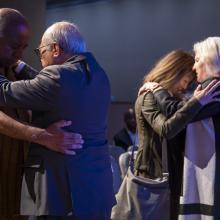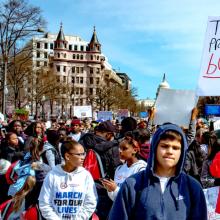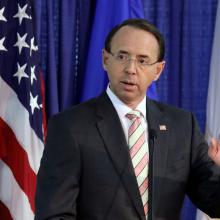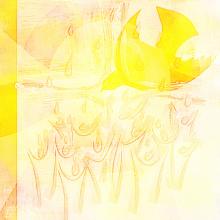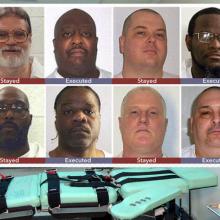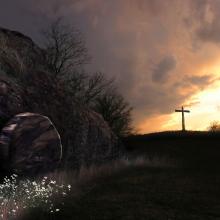Easter
Spiritual disciplines are always timeless, but they also can be powerfully timely in our personal and public lives. Many of us would say that the 2020 presidential election may be the most important in any of our lifetimes for the future of the country, and a sign of whether genuine and inclusive democracy in the United States even has a future. At the same time, calls for prayer, fasting, and repentance are centuries old — they continually demand that Christians go deeper in preparation to worship a risen Christ.
We continually ask, as Christians, what it looks like to embody a Christ who is both risen and stoops down to rip his clothes in lament that things are not as they should be in this world. It is the Easter season, and yet, we mourn.
The election of 2016 and its aftermath have revealed a crisis of politics and faith that continues to get worse in our nation. But the depth of that crisis, now revealed, holds possibility for redemption in our faith, and reform in our nation, that reaches into our churches and local communities.
When new people come to our Mennonite church in North Carolina, whether from other traditions or from no church background, I imagine they are stirred by our views on peace and violence. The strangest part of our religious life is not that we believe that dead people come back to life, or that we try to live like a peasant we believe was God — it is our disposition toward military service.
Sri Lanka said on Monday it was invoking emergency powers in the aftermath of devastating bomb attacks on hotels and churches, blamed on militants with foreign links, in which 290 people were killed and nearly 500 wounded.
Holy Week for Christians represents a dramatic movement from pain to hope. We deeply feel and lament the pain Jesus Christ endured for us, but we also feel our personal pain and the world’s pain. Then we rejoice as that pain gives way to the eternal hope that is always available to us through the resurrection—a hope that is not just for ourselves but for the world. We say “Christ is risen! Christ is risen indeed!” with a joy that surpasses understanding.
Good Friday and Easter Sunday are not just moments of remembering events of 2,000 years ago but a celebration of an ongoing reality. Examples of resurrection come in unlikely places. Recently, I found one in a 2013 study of brain scans or people recovering from severe addictions.
Spring is here once again, and we are watching elements of nature in America slowly come alive as the last hints of winter melt away one day at a time. One of the most incredible things we can learn from the earth is the importance of seeing everything in cycles.
THERE IS SOMETHING SPACIOUS about the gospel viewed through the keyhole of repentance. Something to the spare, Spartan spaces that mark a season of penitence. One chapel I know turns its altar so the people can see Jesus’ dying words: “I thirst.” Another adorns its sanctuary with a bare tree, not a leaf on it. The signs are those of severity. We make a hash of this world. We leave it bare. There is no health in us.
Lent says the tree will not always be bare. We will not always be health-less. And Jesus will not always thirst. Augustine of Hippo says Jesus thirsts for those gathered around him—he longs to drink them in, make them part of his body. That is, Jesus’ own murderers, the oblivious passers-by, his fellow convicts (his own disciples are long gone).
Lent is long. If you’re like me or my church, our Lenten devotions have grown a bit tepid by now. These final weeks are good times for renewal. The first weeks of Easter, in the ancient church, were a time when the newly baptized would gather daily to marvel at the wonders of their new faith. So too can we.
It’s been a year of strange happenings, politically and culturally. Our inclination is to lash out. There is plenty of blame to be distributed. Lent asks us to lash in. We are the first at fault, whoever we are. And then to praise. Try though we might, we cannot stop the Lord of life. And neither can anyone else.
REMEMBER THAT you are dust, and to dust you shall return. The prayer said around the world on Ash Wednesday wielded a rather pointed moral to the tail end of the hottest February on record where I live. Penitents in my neighborhood church shuffled in a sun-kissed line to receive ashes on tanned foreheads, summer sandals slapping the floor. Outside, overeager daffodils bloomed their Easter welcome. A strange one, this backward Lent: balmy with a side of dread.
This existential reversal felt nothing if not timely—all through the winter, a collective litany of weary newsfeeds asked whether we really needed quite so much of it. The first months of this year have witnessed a steady erosion of trust in whatever institutions we had left: the federal government, the electoral process, our checks and balances, our freedoms, our faith, each other. Some trace our hard skid sideways to the election, or the Super Bowl, or the Oscars. (I peg it to the Cubs’ win in November. I grew up in Chicagoland—I know reversing a curse has consequences.)
But there’s something particularly dizzying about the separation of church and earth. The globe is getting hotter every year now, but the effects of this ecological trauma, like any grief, are far from linear. If warming simply meant the usual weather, shifted a month early or late, we could figure out how to recalibrate—but our snowfall is breaking records and our ice caps are melting. A winter afternoon can begin as warm as an early summer day and suddenly drop 25 degrees to freezing rain.
As she speaks in a voice measured but forceful, Milly challenges us to hold the tension between vulnerability and vigilance in dark times. “We must learn to be vulnerable, she says. “But at the same time, we must be vigilant in the dark.” She reminds us that new life — from a cave or from the womb — comes from the dark and from discomfort, not ease. We must tap into that internal fire, the light that comes from the Holy Spirit.
As Christians celebrate the festival this spring in commemoration of Jesus’ resurrection, the familiar sights of the Easter bunny and Easter eggs serve as a reminder of the holiday’s very ancient origins outside of the Christian tradition.
DURING THE Easter season Christians commemorate the resurrection of Jesus Christ, after the devastation of Good Friday, when Christ was crucified. From darkness to light, from pain to healing, from despair to hope, from defeat to victory, from death to life. The resurrection of Jesus Christ is the foundation for our hope as Christians, even—and especially—when it’s hardest to have any hope, like at a time such as this.
I often quote Hebrews 11:1, which says, “Faith is the substance of things hoped for, the evidence of things not seen,” especially around Easter. I often paraphrase the text as, “Hope means believing in spite of the evidence, then watching the evidence change.”
It’s appropriate that, as Christians, we believe in a radical hope, a hope that often comes “in spite of the evidence.” Easter Sunday, which we just celebrated, is the perpetual reminder of the hope that comes when things seem most hopeless. We Christians say we are a resurrection people, and Easter Sunday both reminds us and dares us to prove it—that we are a people who can live our lives in hope, despite the evidence.
IT IS HARD to tell time from inside a tomb. We cannot know how many minutes or hours Jesus’ resurrection took. Traditionally, he was in the tomb for three days. But how long does it really take for someone to rise—or be raised—from the dead?
Some resurrections start at a mundane moment. Dorothy Day, for example, was sitting at the kitchen table in a crowded apartment in New York’s East Village (writing a never-to-be published novel) when the French Catholic theologian Peter Maurin knocked on the door. “It was a long time before I really knew what Peter was talking about that first day,” wrote Day, who went on to found the Catholic Worker movement with Maurin. “But he did make three points I thought I understood: founding a newspaper for clarification of thought, starting houses of hospitality, and organizing farming communes. I did not really think then of the latter two as having anything to do with me, but I did know about newspapers.”
Some resurrections come through brutal suffering. Twenty-four-year-old Recy Taylor was left for dead in 1944 on a dark road near Abbeville, Ala., by the six white men who kidnapped and raped her as she walked home from a prayer meeting at Rock Hill Holiness Church. “A few days later, a telephone rang at the NAACP branch office in Montgomery,” wrote historian Danielle L. McGuire in At the Dark End of the Street. The president of the local branch promised to send his “best investigator” to speak with Recy Taylor. The investigator’s name was Rosa Parks. As part of Park’s organizing work on Taylor’s case, she formed what would become the Montgomery Improvement Association, the leaders responsible for instigating the bus boycott a decade later, an opening salvo of the civil rights movement.
Our concerns about the future of our nation’s values, heart, and soul, and even for democracy itself compel us to respond more theologically than politically, where what we believe is the foundation of the things we must vocally reject. We believe that the future of the nation’s soul, and the integrity of faith, are both at stake.
Most often Pentecost comes to us as a momentous Christian occasion of spiritual power, ethnic unity, gender equality, multi-generational comradery, and immigrant hospitality. But when the moment has passed, it gives way to the more ignoble features of life and community, like spiritual apathy, sexism, racial prejudice, ageism, xenophobia, etc.
You might think these men were sentenced to death and slated for execution simply because of the gravity of their crimes. You’d be wrong.
There is something beyond the terrible crimes that determined their fates even more so: poverty. The death penalty preys on poor and vulnerable populations.
Paschal pardon here exemplifies a miscarriage of justice for one of the prisoners. The custom condemns Jesus, whose guilt is dubious. Ultimately, Jesus divinely conquers the unjust system at hand when he walks freely among his disciples in the flesh, three days after he is crucified as a criminal. But the possibility of a triumphant erasure of crime in the U.S. is limited. Constitutionally, the president can offer clemency — or “leniency” — for any federal offense, aside from cases involved with impeachment, by two methods: commute, which lessens the sentence but retains civil restrictions like the loss of the right to vote, or pardon, which eliminates the sentence entirely.
What if Easter is our starting over point, our "New Year" packed with resolutions to begin again in the ways of grace? What if Easter for us is like those days for Barabbas, those days after he watched this innocent man die on a cross and find him after he'd resurrected? What began again in Barabbas, what new life and fresh perspective?
Pope Francis used his traditional Easter Sunday message to call the bombing of a refugee convoy near Aleppo, Syria, a “despicable attack”, and urged world leaders to “prevent the spread of conflicts” despite mounting tensions in Syria and North Korea.
In his Easter blessing, known as “Urbi et Orbi” (“to the city and the world”), the pope urged the faithful to remember “all those forced to leave their homelands as a result of armed conflicts, terrorist attacks, famine, and oppressive regimes.”


